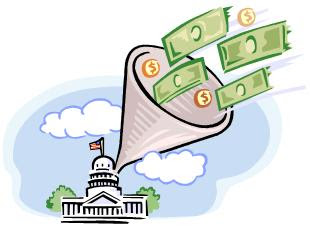
Look in your savings, checking account, or wallet right now. The money in there is worth more today than it ever will be in the future. The reason is something called inflation, and recently it is getting a lot of press. Going back 30 Years to 1981, the average rate of inflation has been 3.31% per year. This means if you had $1,000 in 1981; it only has the spending power of $364.29 today as it did in 1981.
The next topic is taxes. Today there are record deficits and large unfunded liabilities by both state and federal governments. Our population is aging, and our workforce reduced. Politicians have two choices either they can cut benefits or raise tax revenues. So this begs the question, which direction do you think taxes are headed?
So why does traditional thinking say take as many pre-tax dollars today and defer them for use as far in the future as possible? Think about it, we are taking our most valuable money (today’s dollars); deferring taxes in what most likely will be our lowest tax bracket. So one day in the future we will have less buying power and our money will be taxed the most.
How long do you want to do this?
Would you like an alternative?
If you would like an alternative please email me @: josh.smith@gmail.com
I agree, politicians have to either cut programs or raise taxes. I personally believe that taxes must increase. While I will concede that there is graft and waste in the federal budget, cutting entire departments (i.e. education) is akin to throwing the baby out with the bathwater. The budget is one thing, waste and graft is another. federal programs need to be incentivised to change their bad habits. top down cuts don't solve the root problems
ReplyDeleteIn times like these, you may be making extremely valid points, especially if we see across the board tax increases. However, I think the federal government (who ever is in charge) would be foolish to squeeze more out of the lower and alleged middle class.
What bothers me is that people bandy about the phrase "tax bracket" and I convinced that 90% of Americans have no clue what this means. I had to have it explained to me in small words and pictures ;-) I think that 90% of people hear the phrase "tax bracket" and assume that it is a pigeon hole--a way of categorizing wage earners, not wages. If you were to ask what they think of when you say "going in to a higher tax bracket" they would probably express their believe that they would "pay higher taxes" with the implication that it would be across the board on their income. This is not the case though.
For years, I would hear the parents of my more affluent friends (and those like them) complain about "being in a higher tax bracket" . Knowing what I know now, whats the big deal? I know that you are paying more taxes, but that higher tax bracket is only kicking in for your income over the threshold. You know all this, so I am just preaching to the choir, but in 2011, if you make 90k, only about 6400 of that will be in the 28% bracket.
Anyhow, I still think that almost anything is better than a monolithic 401k run by idiots who are just skimming of the top. They have guaranteed profit unlike their customers who lost their shirts.
The only benefit to 401k is that something is better than nothing, at least for many workers. A lot of people don't think about their future nearly enough (myself included) and 401k is a "easy" solution for them. It may not be smart, but its typically a better option than saving nothing and spending all your money on KFC, Nascar, and Snuggies